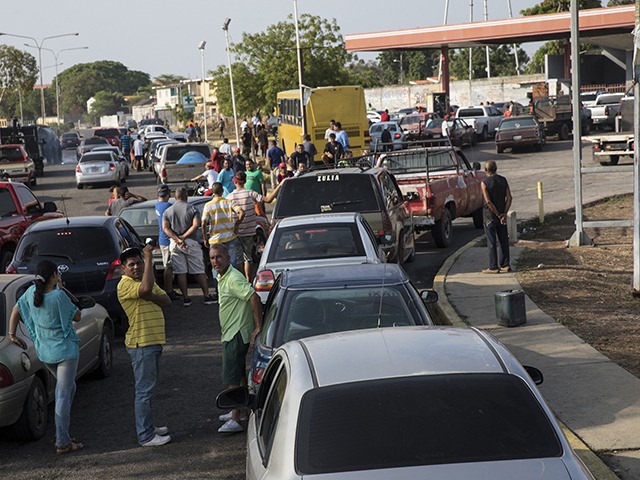Shocking videos of large crowds congregating in Carabobo, Venezuela, to purchase limited supplies of gasoline surfaced on social media Tuesday. Socialist dictator Nicolás Maduro has imposed a mandatory national quarantine, but few Venezuelans are following it.
Maduro has not been president of Venezuela legally since January 2019. Few are following the legitimate president of the country, Juan Guaidó, either. A recent survey found that more Venezuelans identified their head of state as “nobody” than Guaidó.
Venezuela is experiencing extreme gasoline shortages despite sitting on the second-largest known oil reserves on earth, a product of decades of socialist mismanagement of the national oil company, Petróleos de Venezuela (PDVSA).
On Tuesday, authorities announced that a service station in Valencia, Carabobo state, northern Venezuela, would sell small amounts of gasoline, creating a crowd so large they covered what appeared to be a large highway near the station. Most were on motorcycles, waiting for a promised shipment of gasoline to fill their tanks. Few in the videos, shared by the broadcaster TVV News, appear to be wearing masks, and few are six feet apart or more, the recommended distance to prevent coronavirus from spreading.
The Venezuelan newspaper El Nacional noted that the footage appears to show violations of nearly every aspect of Maduro’s quarantine order, which he has taken to bizarrely calling “voluntary” despite mandating everyone obey it. In addition to not wearing masks and creating large, tightly packed crowds, the large number of people suggests that many waiting for gasoline are not essential workers, the only people allowed to be outside.
The crowd flooding the streets also created more car traffic, as several highway lanes were shut down by pedestrian traffic.
El Nacional noted that the Valencia situation was not uncommon nationwide, as Venezuela faces severe fuel shortages. Worsening the situation, Maduro regime officials have limited how many gasoline stations — and how many pumps — can open at a time and when people can go out do conduct essential business, like buy food. The result is larger crowds at the few open gasoline stations and long lines at supermarkets during the limited hours of business.
In Sucre, west of Caracas, local socialist units have imposed schedules for various parts of town to be allowed to engage in essential business only at allotted hours.
“You see the large numbers of people when you limit businesses to open only three hours [a day], one woman in Sucre told the Venezuelan outlet Efecto Cocuyo. Others expressed concern that the limited mobility hours to purchase food and goods would not go away after the pandemic concludes, given Maduro’s history of violent repression of human rights.
In Petare, Miranda state, Efecto Cocuyo found a similar situation — crowds gathering at the specified limited hours to buy food, exacerbating rather than limiting social proximity. There, however, some merchants are trying to limit social contact by defying government rules and conducting business during “illegal” hours.
“I work for a little while, then again a little while, because the police remove us, but we come back when they leave,” one shopkeeper told the outlet.
In other parts of the country, crowds gathered not to buy anything, but to protest their inability to buy gasoline. In Falcón state, northwest Venezuela, Maduro’s Bolivarian National Guard (GNB) attacked protesters demanding access to fuel with tear gas.
Last week, similar protests broke out in the capital, Caracas, over lack of access to water. Medical experts consider washing hands and cleaning the most important activities to preventing the spread of coronavirus, but Venezuela’s collapsing infrastructure has resulted in many families forced to ration water as they can access clean supplies only for short times on a daily or even weekly basis.
Venezuela was once so oil-rich that many were able to procure gasoline for free or at exorbitantly cheap prices. By 2020, PDVSA’s oil production levels had dropped by over 90 percent of the amounts obtained before late dictator Hugo Chávez nationalized the company. Venezuelan oil, once to pay for alliances with Cuba, Nicaragua, and others in the region, is so hard to come by that Maduro has resorted to importing oil from leftist allies like China and Russia in exchange for allegiances to their respective regimes and predatory debts.
The oil shortage — as Venezuela’s oil sources have suffered from the consequences of the Chinese coronavirus pandemic, as well — has resulted in a significant threat to Venezuela’s already meager food supply, also destroyed by socialist mismanagement.
The head of Venezuela’s National Federation of Ranchers, Nicanor Oropeza, reportedly warned on Tuesday that ranchers’ inability to ship meat and other food stocks to supermarkets could generate disastrous results for the country. Oropezo described the situation as an “emergency” and warned that severe food shortages in the stores while meat and produce rot in farms could follow the gasoline shortages.
The Maduro regime has largely ignored the protests, instead condemning the United States for its human rights sanctions on Maduro and his cronies. The regime also claimed it has tested more citizens than any country in Latin America, based on unverified regime statistics.

COMMENTS
Please let us know if you're having issues with commenting.